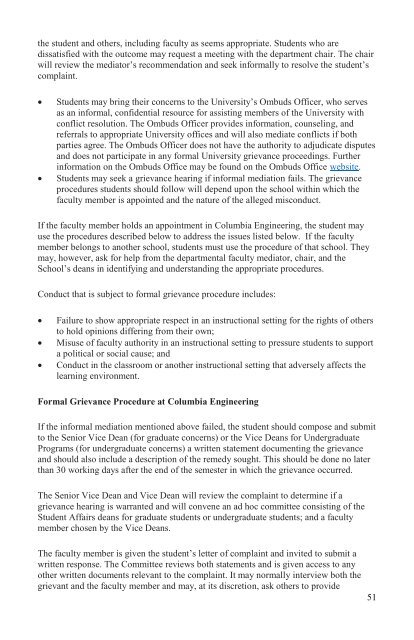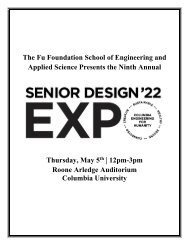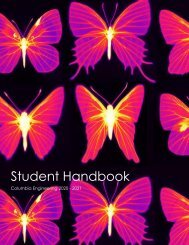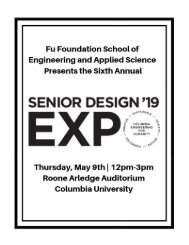SEAS Student Handbook
You also want an ePaper? Increase the reach of your titles
YUMPU automatically turns print PDFs into web optimized ePapers that Google loves.
the student and others, including faculty as seems appropriate. <strong>Student</strong>s who are<br />
dissatisfied with the outcome may request a meeting with the department chair. The chair<br />
will review the mediator’s recommendation and seek informally to resolve the student’s<br />
complaint.<br />
<br />
<br />
<strong>Student</strong>s may bring their concerns to the University’s Ombuds Officer, who serves<br />
as an informal, confidential resource for assisting members of the University with<br />
conflict resolution. The Ombuds Officer provides information, counseling, and<br />
referrals to appropriate University offices and will also mediate conflicts if both<br />
parties agree. The Ombuds Officer does not have the authority to adjudicate disputes<br />
and does not participate in any formal University grievance proceedings. Further<br />
information on the Ombuds Office may be found on the Ombuds Office website.<br />
<strong>Student</strong>s may seek a grievance hearing if informal mediation fails. The grievance<br />
procedures students should follow will depend upon the school within which the<br />
faculty member is appointed and the nature of the alleged misconduct.<br />
If the faculty member holds an appointment in Columbia Engineering, the student may<br />
use the procedures described below to address the issues listed below. If the faculty<br />
member belongs to another school, students must use the procedure of that school. They<br />
may, however, ask for help from the departmental faculty mediator, chair, and the<br />
School’s deans in identifying and understanding the appropriate procedures.<br />
Conduct that is subject to formal grievance procedure includes:<br />
<br />
<br />
<br />
Failure to show appropriate respect in an instructional setting for the rights of others<br />
to hold opinions differing from their own;<br />
Misuse of faculty authority in an instructional setting to pressure students to support<br />
a political or social cause; and<br />
Conduct in the classroom or another instructional setting that adversely affects the<br />
learning environment.<br />
Formal Grievance Procedure at Columbia Engineering<br />
If the informal mediation mentioned above failed, the student should compose and submit<br />
to the Senior Vice Dean (for graduate concerns) or the Vice Deans for Undergraduate<br />
Programs (for undergraduate concerns) a written statement documenting the grievance<br />
and should also include a description of the remedy sought. This should be done no later<br />
than 30 working days after the end of the semester in which the grievance occurred.<br />
The Senior Vice Dean and Vice Dean will review the complaint to determine if a<br />
grievance hearing is warranted and will convene an ad hoc committee consisting of the<br />
<strong>Student</strong> Affairs deans for graduate students or undergraduate students; and a faculty<br />
member chosen by the Vice Deans.<br />
The faculty member is given the student’s letter of complaint and invited to submit a<br />
written response. The Committee reviews both statements and is given access to any<br />
other written documents relevant to the complaint. It may normally interview both the<br />
grievant and the faculty member and may, at its discretion, ask others to provide<br />
51








